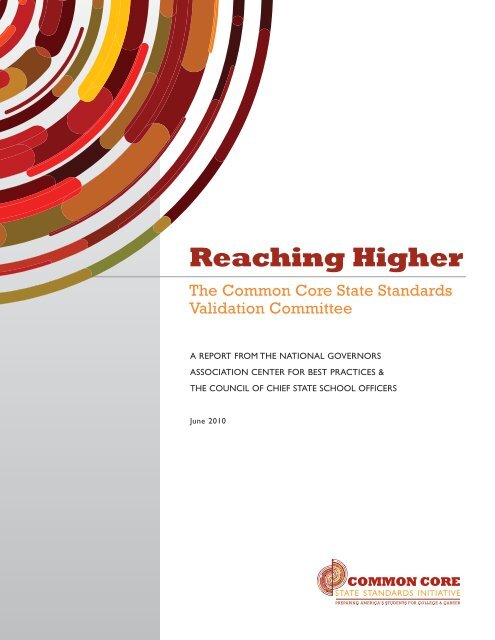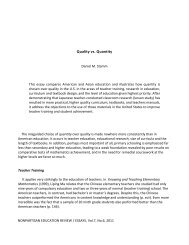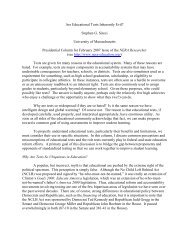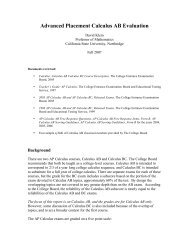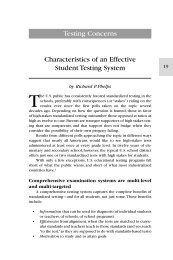Reaching Higher - Common Core State Standards
Reaching Higher - Common Core State Standards
Reaching Higher - Common Core State Standards
- No tags were found...
Create successful ePaper yourself
Turn your PDF publications into a flip-book with our unique Google optimized e-Paper software.
National Governors Association Center for Best PracticesFounded in 1908, the National Governors Association (NGA) is the collective voice of the nation’s governors and oneof Washington, D.C.’s most respected public policy organizations. Its members are the governors of the 50 states, threeterritories, and two commonwealths. NGA provides governors and their senior staff members with services thatrange from representing states on Capitol Hill and before the Administration on key federal issues to developing andimplementing innovative solutions to today’s most pressing public policy challenges through the NGA Center for BestPractices (NGA Center).The NGA Center is the only research and development firm that directly serves the nation’sgovernors. For more information, visit www.nga.org.Council of Chief <strong>State</strong> School OfficersThe Council of Chief <strong>State</strong> School Officers (CCSSO) is a nonpartisan, nationwide, nonprofit organization of publicofficials who head departments of elementary and secondary education in the states, the District of Columbia, theDepartment of Defense Education Activity, and five U.S. extra-state jurisdictions. CCSSO provides leadership, advocacy,and technical assistance on major educational issues.The Council seeks member consensus on major educationalissues and expresses their views to civic and professional organizations, federal agencies, Congress, and the public. Formore information, visit www.ccsso.org.AcknowledgmentThe NGA Center and CCSSO wish to acknowledge the work of Denis P. Doyle, chief academic officer of Schoolnet,Inc., for the preparation of this report. Doyle, a nationally and internationally known education writer and consultant,is co-author, with Susan Pimentel, of the book Raising the Standard:An eight-step action guide for schools and communities(Corwin Press, 1999).© Copyright 2010, NGA and CCSSOCopies are available from:National Governors Association444 N. Capitol St. NW, Suite 267Washington, DC 20001(202) 624-5300
<strong>Reaching</strong> <strong>Higher</strong>The <strong>Common</strong> <strong>Core</strong> <strong>State</strong> <strong>Standards</strong> Validation CommitteeA REPORT FROM THE NATIONAL GOVERNORS ASSOCIATION CENTER FOR BEST PRACTICES &THE COUNCIL OF CHIEF STATE SCHOOL OFFICERSJune 2010
The <strong>Common</strong> <strong>Core</strong> <strong>State</strong> <strong>Standards</strong> Initiative Validation CommitteeCo-ChairsDavid Conley—Professor and Director of the Center for Educational Policy Research, Educational Methodology,Policy, and Leadership at the University of Oregon’s College of Education.Brian Gong—Executive Director of the National Center for the Improvement of Educational Assessment.MembersBryan Albrecht—President of Gateway Technical College, Kenosha,Wis.Arthur Applebee—Distinguished Professor of Education and Director of the Center on English Learning &Achievement at the University at Albany–<strong>State</strong> University of NewYork.Sarah Baird—Mathematics Specialist/Teacher, Kyrene Elementary School District,Tempe,Ariz.Jere Confrey—Senior Research Fellow and Joseph D.Moore Distinguished Professor at The William & Ida FridayInstitute for Educational Innovation, North Carolina <strong>State</strong> University’s College of Education.Kristin Buckstad Hamilton—Nationally Board CertifiedTeacher, Battlefield Senior High School, NationalEducation AssociationLinda Darling-Hammond—Charles Ducommon Professor of Education and Co-Director of the School RedesignNetwork at Stanford University’s School of Education.Alfinio Flores—Hollowell Professor of Mathematics Education in the Department of Mathematical Sciences andSchool of Education at the University of Delaware’s College of Education & Public Policy.Kenji Hakuta—Lee L. Jacks Professor of Education at Stanford University’s School of Education.Feng-Jui Hsieh—Associate Professor in the Mathematics Department at the National Taiwan Normal University.Mary Ann Jordan—Teacher, New York City Dept. of Education,American Federation of TeachersJeremy Kilpatrick—Regents Professor of Mathematics Education at the University of Georgia.Dr. Jill Martin—Principal, Pine Creek High SchoolR. James Milgram—Emeritus Professor at Stanford University’s Department of Mathematics.David Pearson—Professor and Dean of the Graduate School of Education at the University of California–Berkeley.Steve Pophal—Principal, D.C. Everest Junior HighStanley Rabinowitz—Director,Assessment & <strong>Standards</strong> Development Services at WestEd in San Francisco.Lauren Resnick—Professor and Director of the Institute for Learning at the University of Pittsburgh.Andreas Schleicher—Head of the Indicators and Analysis Division with the Organisation for Economic Co-operationand Development’s Directorate for Education.William Schmidt—University Distinguished Professor and Co-Director of Michigan <strong>State</strong> University’s EducationPolicy Center.Catherine Snow—Henry Lee Shattuck Professor of Education, Harvard Graduate School of Education.Christopher Steinhauser—Superintendent of Schools, Long Beach Unified School District, California.Sandra Stotsky—Endowed Chair in Teacher Quality at the University of Arkansas’s Department of Education Reformand Chair of the Sadlier Mathematics Advisory Board.Dorothy Strickland—Distinguished Research Fellow at the National Institute for Early Education Research and theSamuel DeWitt Proctor Chair in Education at Rutgers University.Martha Thurlow—Director, National Center on Educational Outcomes.Norman L.Webb—Senior Research Scientist with the Wisconsin Center for Education Research and the NationalInstitute for Science Education, both based at the University of Wisconsin–Madison’s School of Education.Dylan William—Director, Learning and Teaching Research Center at the Educational Testing Service.
›› Reflective of the core knowledge and skills in ELA and mathematics that students need to becollege- and career-ready;›› Appropriate in terms of their level of clarity and specificity;›› Comparable to the expectations of other leading nations;›› Informed by available research or evidence;›› The result of processes that reflect best practices for standards development;›› A solid starting point for adoption of cross-state common core standards; and›› A sound basis for eventual development of standards-based assessments.THE FUTURE: A WORK IN PROGRESSThe certification and release of the <strong>Common</strong> <strong>Core</strong> <strong>State</strong> <strong>Standards</strong> is a historic milestone; however, it doesnot mark the end of the work. Standard setting is an iterative process; there is no finish line.Alignment ofcurricula and assessments to the <strong>Common</strong> <strong>Core</strong> <strong>State</strong> <strong>Standards</strong>—the next great task facing the states—willbe essential to the staying power and lasting impact of the standards.The vital task of maintaining the continuity of the standards over time is another challenge.The standards willneed to be continuously updated through processes that may, on occasion, pull stakeholders in oppositedirections as consistency competes with the inevitable calls for changes or adjustments.Effective long-term governance and organization of the CCSSI—sustaining a complex and demandingprocess over the span of years—is critical.The NGA Center and CCSSO are committed to ensuring thatthe <strong>Common</strong> <strong>Core</strong> <strong>State</strong> <strong>Standards</strong> remain state-driven and state-based.This includes encouraging statesto lead cycles of revisions to the standards as new knowledge, best practices, and research emerge.Therole of the VC or a similar structure will also need to be incorporated into the structure of long-termstandards revision and governance.In conclusion, it is worth remembering that the CCSSI was built on the following foundations:›› While the states are autonomous, when they work together on matters such as education, the collectiveknowledge can yield significant improvements.›› When the states voluntarily move in the same direction, they demonstrate their ability to achievenational goals.These certified research- and evidenced-based standards—aligned with college and career expectations—respect unique state contexts and the authority of each state to govern its public education system.Thelasting hallmark of this process on student achievement, then, will be clear, easy, and straightforwardcomparability over time—standard by standard, assessment by assessment, and state by state.Thesecommon standards are an important step in bringing about a real and meaningful transformation of theeducation system for the benefit of all students.The CCSSI is more than a symbol of interstate collaboration; it could usher in a new era of cooperationon important public policy matters. It reflects 21st Century America as a place where states have cometogether on a shared vision of excellence.3
CERTIFICATIONBased on the deliberations of, and review by, the Validation Committee, the National GovernorsAssociation Center for Best Practices and the Council of Chief <strong>State</strong> School Officers acceptthe Validation Committee’s certification that the <strong>Common</strong> <strong>Core</strong> <strong>State</strong> <strong>Standards</strong> in Englishlanguage arts and mathematics are consistent with the criteria established in the charge to theValidation Committee.Signed,Bryan AlbrechtArthur ApplebeeSarah BairdJere ConfreyDavid T. ConleyLinda Darling-HammondBrian GongKenji HakutaKristin Buckstad HamiltonFeng-Jui HsiehMary Ann JordanJeremy KilpatrickDr. Jill MartinDavid PearsonSteve PophalStanley RabinowitzLauren ResnickAndreas SchleicherWilliam SchmidtCatherine SnowChristopher SteinhauserDorothy StricklandMartha ThurlowNorman Webb4
APPENDIX 1Validation Committee Members Biographical SketchesBryan AlbrechtPresident of GatewayTechnical College, a two-year college in Kenosha,WisconsinAlbrecht also serves as president of the Association for Career andTechnical Education and on the president’s advisory council for theNational Coalition of Advanced Technology Centers. He has abackground in secondary and postsecondary education, serves onnumerous workforce-related boards, and participates in relatedstandards and assessment organizations that bridge the education andeconomic and workforce development fields.Arthur ApplebeeDistinguished Professor of Education and Director of the Center on EnglishLearning & Achievement at the University at Albany–<strong>State</strong> University of NewYorkApplebee is a nationally recognized authority on English language arts anda long-time advisor to the National Assessment of Educational Progress(NAEP). He received the David A. Russell Award for DistinguishedResearch in the Teaching of English from the National Council of Teachersof English for his book, Curriculum as Conversation:TransformingTraditions ofTeaching and Learning, which re-conceptualized the role of curriculum inAmerican schools. He has also advised policymakers at the national, state,and district levels on curriculum, instruction, and assessment.Sarah BairdMathematics Specialist/Teacher with Kyrene Elementary School District inTempe,ArizonaBaird, a National Board for Professional Teaching <strong>Standards</strong>–certifiedinstructor, was named Arizona Teacher of the Year in 2009 and is amember of Arizona’s Science,Technology, Engineering, and MathematicsAcademy. Baird, who is the math coach for two district schools, servesK-5 students in roughly 60 classrooms.Jere ConfreySenior Research Fellow and Joseph D. Moore Distinguished Professor at TheWilliam & Ida Friday Institute for Educational Innovation at North Carolina<strong>State</strong> University’s College of EducationConfrey has co-authored research for the National Research Council’sScientific Research in Education; produced extensive work in formativeassessment in mathematics; and participates in the Generating IncreasedScience and Math Opportunities (GISMO) lab.David ConleyProfessor and Director of the Center for Educational Policy Research,Educational Methodology, Policy, and Leadership at the University of Oregon’sCollege of EducationConley has conducted extensive research on standards-based educationand systemic school reform. He also directed the <strong>Standards</strong> for Successproject for the Association of American Universities and The PewCharitable Trusts, which documented the knowledge and skills studentsneed to succeed in entry-level university courses. His recent book,College Knowledge, expands on this line of research.Linda Darling-HammondCharles Ducommon Professor of Education and Co-Director of the SchoolRedesign Network at Stanford University’s School of EducationDarling-Hammond’s focus is on international curriculum studies, schoolrestructuring, teacher quality, and educational equity. She is formerpresident of the American Educational Research Association and formerexecutive director of the National Commission on Teaching & America’sFuture, whose 1996 report, What Matters Most:Teaching for America’sFuture, led to sweeping teaching and teacher education policy changes.Alfinio FloresHollowell Professor of Mathematics Education in the Department of MathematicalSciences and School of Education at the University of Delaware’s College ofEducation & Public PolicyFlores is a nationally recognized expert in mathematics education andmathematics teaching and learning, curriculum development, and preandin-service preparation of teachers of mathematics.Brian GongExecutive Director of the National Center for the Improvement ofEducational AssessmentGong is a nationally recognized expert in standards and assessment and aresearch scientist. He has served as associate commissioner for theKentucky Department of Education.As a former member of the technicaladvisory committee for the New England <strong>Common</strong> Assessment Program,Gong possesses a keen understanding of the working relationship betweenstandards and large-scale assessment programs.Kenji HakutaLee L. Jacks Professor of Education at Stanford University’s School of EducationHakuta’s studies focus on bilingualism and the acquisition of English inimmigrant students. He co-authored the National Academy of Sciencesreport, Improving Schooling for Language-Minority Children:A ResearchAgenda; co-edited a book on affirmative action in higher education,Compelling Interest: Examining the Evidence on Racial Dynamics in Collegesand Universities; has testified before Congress on topics such as languagepolicy, the education of language-minority students, affirmative action inhigher education, and the improvement of quality in educational research;and was founding dean of the University of California–Merced School ofSocial Sciences, Humanities and Arts.Kristin Buckstad HamiltonNationally Board CertifiedTeacher, Battlefield Senior High School, NationalEducation AssociationFeng-Jui HsiehAssociate Professor in the Mathematics Department at the National TaiwanNormal UniversityHsieh researches mathematics learning, mathematics teaching, teachereducation, and pre-service and in-service teacher professional development.He served as chairman of Taiwan’s first evaluation committee of the juniorhigh school mathematics textbook, as a member of the first evaluationcommittee of the elementary school mathematics textbook, and as amember of the committee to develop the first national curriculumstandards for private textbook publishers at the senior high school level. Hehas received grants fromTaiwan’s National Science Council and Ministry ofEducation. Hsieh serves asTaiwan’s representative on two internationalstudies administered by the International Association for the Evaluation ofEducational Achievement and the National Science Foundation.Mary Ann JordanTeacher, NewYork City Dept. of Education,American Federation ofTeachersJeremy KilpatrickRegents Professor of Mathematics Education at the University of GeorgiaKilpatrick, a charter member of the National Research Council’s (NRC)Mathematical Sciences Education Board, has received numerous educationawards, including the Felix Klein Medal in 2007 for lifetime achievement inmathematics education from the International Commission on MathematicalInstruction and the 2003 Lifetime Achievement Award for DistinguishedService to Mathematics Education from the National Council ofTeachers ofMathematics. He chaired the committee that produced Adding It Up: HelpingChildren Learn Mathematics, a 2001 NRC report on arithmetic proficiency.Dr. Jill MartinPrincipal, Pine Creek High School5
R. James MilgramEmeritus Professor at Stanford University’s Department of MathematicsMilgram, one of the authors of the California Mathematics <strong>Standards</strong> andthe California Mathematics Framework, has worked with a number ofstates, and with the Achieve Mathematics Advisory Panel, on standards ineducation.As a member of the National Board for Education Sciences, hehas worked with the U.S. Department of Education on the math that preserviceK-8 teachers need to know and understand.David PearsonProfessor and Dean of the Graduate School of Education at the University ofCalifornia–BerkeleyPearson, a literacy expert, conducts research on practice and policy inliteracy instruction and assessment. He was president of the NationalReading Conference and served on the board of directors for theInternational Reading Association, National Reading Conference, andAmerican Association of Colleges for Teacher Education, all of whichbestowed on Pearson several honors and awards for his service.Steve PophalPrincipal, D.C. Everest Junior HighStanley RabinowitzDirector of Assessment & <strong>Standards</strong> Development Services at WestEdin San Francisco, CaliforniaAt WestEd, Rabinowitz oversees program activities and directsassessment development for the Kentucky and Nevada statewideassessment programs. He also directs the WestEd/CRESST Assessmentand Accountability Comprehensive Center. He has authored papers onthe use of integrated standards and assessment systems in high-stakesstate programs and worker-training initiatives and directed the statewideassessment program for the New Jersey Department of Education.Lauren ResnickProfessor and Director of the Institute for Learning at the University of PittsburghResnick is an internationally known scholar in the cognitive science oflearning and instruction whose research involves the learning andteaching of literacy, math, and science. She is former director of theLearning Research and Development Center at the University ofPittsburgh. Resnick also co-founded the New <strong>Standards</strong> Project, a nearly10-year effort to develop performance-based standards and assessmentsthat widely influenced state and school district practices.Andreas SchleicherHead of the Indicators and Analysis Division with the Organisation for EconomicCo-operation and Development’s (OECD) Directorate for EducationSchleicher also directs OECD’s Programme for International StudentAssessment (PISA) and the Indicators of Education Systems program.She previously served as director for analysis at the Institute forEducational Research in the Netherlands. She was awarded the TheodorHeuss prize for exemplary democratic engagement in association withthe public debate on PISA.William SchmidtUniversity Distinguished Professor and Co-Director of Michigan <strong>State</strong>University’s Education Policy CenterSchmidt also co-directs the US–China Center for Research on EducationalExcellence and the Promoting Rigorous Outcomes in Math and ScienceEducation Project. He has provided recommendations for internationallycompetitive K-12 math standards for Minnesota and participated in theThird International Mathematics and Science Study.Christopher SteinhauserSuperintendent of Schools for the Long Beach Unified School Districtin CaliforniaSteinhauser possesses extensive knowledge about California’s ELAstandards and their implementation across a very large school district.During his previous tenure as deputy superintendent, students in allmajor racial and ethnic groups throughout the district madeunprecedented gains on rigorous state tests.Sandra StotskyEndowed Chair in Teacher Quality at the University of Arkansas’s Departmentof Education Reform and Chair of the Sadlier Mathematics Advisory BoardStotsky has abundant experience in developing and reviewing ELAstandards.As senior associate commissioner of the MassachusettsDepartment of Education, she helped revise pre–K-12 standards. Shealso served on the 2009 steering committee for NAEP reading and onthe 2006 National Math Advisory Panel.Dorothy StricklandDistinguished Research Fellow at the National Institute for Early EducationResearch and the Samuel DeWitt Proctor Chair in Education at RutgersUniversityA national expert on literacy, Strickland assisted the New JerseyDepartment of Education with developing its ELA standards for youngchildren. She has served on many national panels and task forces overher multi-decade career in education, most recently on the NationalCenter for Learning Disabilities professional advisory board and on aHead Start research and evaluation board at the U.S. Department ofHealth and Human Services.Martha ThurlowDirector of the National Center on Educational OutcomesThurlow focuses on implications of contemporary U.S. policy andpractice for students with disabilities and English language learners,including national and statewide assessment policies and practices,standards-setting efforts, and graduation requirements. She hasconducted research and published extensively on assessment, learningdisabilities, early childhood education, dropout prevention, effectiveclassroom instruction, and integration of students with disabilities ingeneral education settings.Norman L.WebbSenior Research Scientist with the Wisconsin Center for Education Researchand the National Institute for Science Education, both based at the Universityof Wisconsin–Madison’s School of EducationWebb works on strategies for evaluating reform and rethinking aspectsof math and science education. He also conducts research on assessingstudents’ knowledge of math and science and aligning standards andassessments, and directs evaluations of curriculum and professionaldevelopmentprojects.Dylan WilliamDirector of the Learning and Teaching Research Center at the EducationalTesting ServiceWilliam has taught Master’s and doctorate-level courses on educationalassessment, research methods, and the use of information technology inacademic research. He served as the academic coordinator for theConsortium for Assessment and Testing in Schools, which developed avariety of statutory and non-statutory assessments for the nationalcurriculum of England andWales. He is currently exploring howassessments can be used to support learning.Catherine SnowHenry Lee Shattuck Professor of Education at the Harvard Graduate Schoolof EducationAn international expert on literacy instruction, Snow has chaired severalmajor committees on literacy, has studied low-income students, and haswritten about bilingualism and its relation to language-policy issues.6
National Governors Association444 N. Capitol St. NW, Suite 267Washington, DC 20001(202) 624-5300Council of Chief <strong>State</strong> School OfficersOne Massachusetts Ave. NW, Suite 700Washington, DC 20001(202) 336-7000


